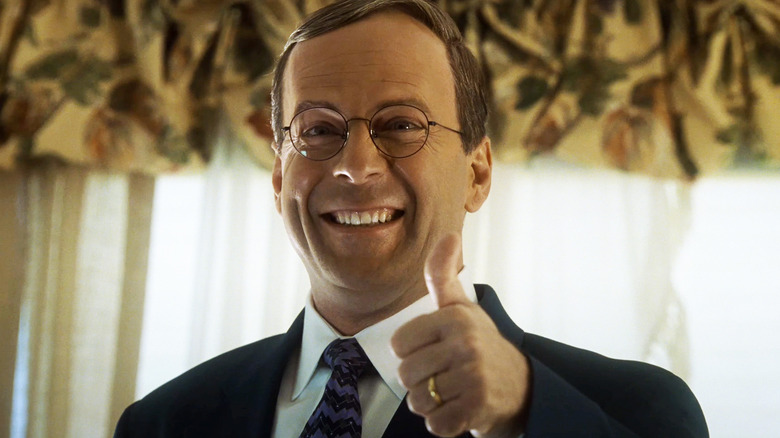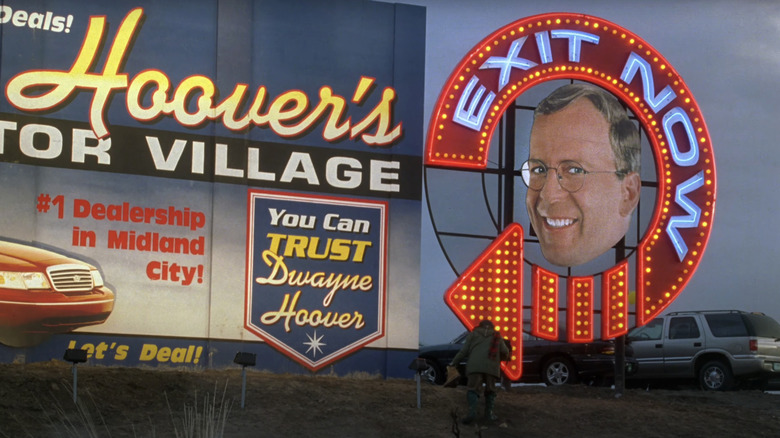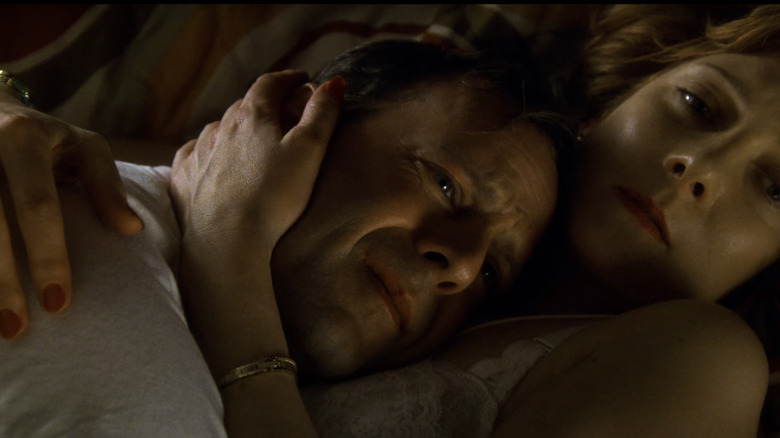The Bruce Willis Box Office Flop That Didn't Even Make $200,000
In 2022, Bruce Willis retired from acting following a diagnosis of aphasia, which was then confirmed to be frontotemporal dementia the following year. That sobering development certainly cast his late-career choices in a different light. Willis' final movie was the overlooked 2023 sci-fi action thriller "Assassin," but for the most part he had become a rent-a-star for low budget B-movie schlock. Considering what we now know about his health, however, much of that could easily be explained as a man trying to make his money before it was too late. Such a state of affairs would make for a sad ending to a career that otherwise remains one of the most impressive in Hollywood history. But even with a slew of middling action thrillers populating his later filmography, nothing could really take away from Willis' standing as one of the best to ever do it.
Willis was and is a movie star in every sense of the word. He not only redefined what an action hero could be in the '80s with "Die Hard," but he also had a real versatility that had previously allowed him to front the ABC comedy drama "Moonlighting," and would see him carry everything from psychological thrillers such as "The Sixth Sense" to comedies such as "The Whole Nine Yards." As dire as some of his more recent choices have been, then, his early filmography will always speak for itself.
But even in his heyday, the "Die Hard" star was no stranger to box office flops and critical failures. Willis regretted starring in the infamous 1990 flop that was "The Bonfire of the Vanities," and then there was, of course, his notorious 1991 misfire "Hudson Hawk," a misunderstood commercial disaster that nearly ruined his career. But neither of those really match the outright blunder that was 1999's "Breakfast of Champions," a film that was essentially withdrawn from public consumption immediately following its abysmal critical debut. As with so many films lambasted upon their arrival, the film has undergone somewhat of a reappraisal as the years have gone on. In 2024, IndieWire called it "One of Bruce Willis' best movies," and YouTube is full of video essays about how the film deserves a second look. Nevertheless, at the time of its release, "Breakfast of Champions" was met with a reaction worse than some of the stuff from Willis' late-career B-movie run.
Bruce Willis' box office flop was a misunderstood satire
Having previously worked together on the 1991 neo-noir thriller "Mortal Thoughts," Bruce Willis and director Alan Rudolph decided to reteam for "Breakfast of Champions" in 1999. An adaptation of Kurt Vonnegut, Jr.'s 1973 novel of the same name, the movie saw Willis playing the lead role of car salesman Dwayne Hoover, who is teetering on the edge of a nervous breakdown. Even though he's respected as the finest salesman in the fictional Midland City, Indiana, Hoover feels so isolated and is so consumed by his mid-life neurosis that he frequently goes through the motions of ending it all, stopping short of actually pulling his revolver's trigger. When science fiction author Kilgore Trout (Albert Finney) comes to Midland City for an arts festival, Hoover tracks him down in search of answers to his ongoing turmoil. The film actually strays from the book throughout, most notably by ending on a much more life-affirming note after Hoover takes Trout's assertion that "It's our life" to heart and reclaims ownership of his story.
"Breakfast of Champions" was a satirical take on the America of the late '90s, taking aim at its rampant commercialism which robs individuals — in this case Dwayne Hoover — of a real sense of self. The tone of the film is outlandish, erratic, and even cartoonish at times, sending up the absurdity of modern life in the American suburbs and at times conveying a sort of prototypical "Tim & Eric Great Show, Awesome Job!" — style. The commercial that opens the film is basically "Free Real Estate." It's that same dark comedic style, whereby every absurd beat is haunted by the sense that something is deeply wrong under the surface.
If that sounds at all interesting, the critics certainly didn't think so at the time. "Breakfast of Champions" was savaged upon its debut, and the box office wasn't much better.
Breakfast of Champions was a critical and commercial disaster
How bad was the box office for "Breakfast of Champions." $178,000 on a budget of $12 million bad. Just to make sure you read that right, that's not $178 million, but $178,000. How bad were the critical reactions? Entertainment Weekly calling the film "Unwatchable" bad. Or, so bad that the movie was pulled from wide release after its initial theatrical debut on September 17, 1999. Speaking to IndieWire, Alan Rudolph described the movie as "radioactive" upon its release. The distributor, Buena Vista, buried the movie after abysmal initial reactions, to the extent that even Rudolph couldn't get a copy of his movie. "I went to Wherehouse Records the day they were closing and found the DVD in the 99-cent bin," he said. "That was my only copy of the movie."
What makes this whole debacle even worse is that Bruce Willis was excited enough to make the movie that he secured the funding himself. As Rudolph told IndieWire
"[Bruce] read it and said, 'Let's go.' I said, 'When, a hundred years from now?' And he said, 'No, I'll get the money as long as we don't spend a lot. But I need to go now, as soon as possible.' I don't know where Bruce got the money, but he snapped his fingers, and a few months later, we were shooting."
Of course, without a studio backing the project, Rudolph and his star were free to make whatever movie they wanted, leading to a truly original and subversive effort that stunned critics for all the wrong reasons, as well as the distributor. "We had no interference," Rudolph told IndieWire, adding, "The powers that be saw it and treated it like some kind of radioactive rock or a fatal disease. Everyone just pretended that it wasn't there."
Today, the movie has a 27% score based on 49 reviews on Rotten Tomatoes, and was described by Rudolph as "one of the most reviled films in modern American cinema," although he maintains that it is his "proudest achievement." While the same might not hold true for Willis and his muscular filmography, "Breakfast of Champions" remains another example of the man's remarkable versatility and a box office bomb that is actually worth watching. As such, it deserves all the reappraisal it has coming its way.


